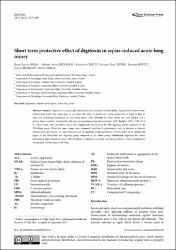Short term protective effect of digitoxin in sepsis-induced acute lung injury

View/
Access
info:eu-repo/semantics/openAccessDate
2022Author
Bora, Ejder SaylavErdoğan, Mümin Alper
Özkul, Bahattin
Sever, İbrahim Halil
Söğüt, İbrahim
Hürdağ, Canan
Erbaş, Oytun
Metadata
Show full item recordCitation
SAYLAV BORA, E., ALPER ERDOĞAN, M., ÖZKUL, B., HALIL SEVER, İ., SÖĞÜT, İ., HÜRDAĞ, C., & ERBAŞ, O. (2022). Short term protective effect of digitoxin in sepsis-induced acute lung injury. BIOCELL, 46(2), pp. 433-439, https://doi.org/10.32604/biocell.2022.018510 Abstract
Digitoxin is a cardiac glycoside used in the treatment of heart failure. Inspired by its known antiinflammatory effect, this study aims to investigate the effect of digoxin in a sepsis model and to bring to light its
effect and underlying mechanism in acute lung injury (ALI). Method: 28 wistar albino rats were divided into 4
groups. Sepsis model is performed by the feces intraperitoneal-injection procedure (FIP). Results: TNF-a, CRP, IL-6,
IL 1-Beta, lactic acid, and MDA values were significantly decreased in the FIP+digitoxin group compared to the
FIP+Saline group. When the same groups were examined, histological improvements such as decrease in alveolar
inflammation and decrease in septal thickening in the digitoxin group and thorax CT were found to be significantly
higher in the Hounsfield unit digitoxin group compared to the Saline group. Conclusion: Digitoxin has shown
biochemical improvement in sepsis with all known mechanisms of action, and healing effects in both computerized
tomography and histology in the lung.
















